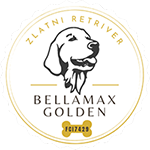
Golden Retriever Health
 Deworming and Parasite Control
Deworming and Parasite Control
Parasites can cause serious complications in dogs, including severe illnesses and even death. That’s why it’s very important to stay informed about parasitic diseases and to regularly deworm your pet against all types of parasites.
First of all, parasites can be external or internal. External parasites include ticks, fleas, mites, lice, and demodex parasites. Internal parasites include roundworms and tapeworms (intestinal), as well as heartworms (in the bloodstream).
Fleas act as intermediate hosts for the development of the canine tapeworm, and they can be a source of infection for puppies. If you notice fleas on a puppy, be sure to consult your veterinarian about which treatment is safe for young dogs.
External parasites in adult dogs are treated with various powders, solutions, and spot-on ampoules. These products are available in veterinary pharmacies, clinics, and pet shops, but always consult your veterinarian before using any of them.
When it comes to puppies, deworming for internal intestinal parasites must be done before vaccination. The first deworming is typically carried out at 3 weeks of age (21 days). The treatment is repeated at 5 weeks of age (35 days). During both of these treatments, it is essential to deworm both the mother and the puppies. After this period, deworming should be repeated at 8 and then at 11 weeks of age, and later on, it can be done every 3 to 4 months.
Adult dogs should be treated 3 to 4 times per year.
To effectively deworm puppies, you can use a paste or syrup designed for young dogs, but the dosage must be determined strictly based on the veterinarian’s advice and the puppy’s weight. For adult dogs, your vet will already be familiar with the dog’s medical history and will recommend the most suitable tablets for your pet.
 Golden Retriever Vaccination
Golden Retriever Vaccination
At birth, puppies that nurse (especially those that consume colostrum) inherit protective antibodies from their mother, which protect them for about six weeks. The first vaccine a puppy can receive is a bivalent “puppy” vaccine against canine distemper and parvovirus, typically given at 28 days of age for puppies at higher risk of infection. Alternatively, a pentavalent vaccine is given at six weeks of age. The second dose of the pentavalent vaccine is administered at 9 weeks, and the final third dose is given at 12 weeks of age—when the immune system is most developed, allowing for the strongest immune response.
According to the latest guidelines from the World Small Animal Veterinary Association, it is best to give the first vaccine at 6 weeks of age, followed by two additional doses at intervals of 3 to 4 weeks.
The strength of the immune response depends on the individual puppy’s immune system. That’s why only healthy and properly dewormed puppies should be vaccinated.
The pentavalent vaccine provides protection against the following diseases:
- Parvovirus
- Canine distemper virus (morbillivirus)
- Adenovirus
- Parainfluenza virus
- Certain strains of Leptospira bacteria
All infectious diseases caused by the listed viruses and bacteria have a high mortality rate, even with proper treatment. The only disease that is age-specific is parvovirus (affecting only young dogs), while all other infectious diseases can also affect older dogs.
After vaccination, a dog develops immunity only after 7–14 days, so during this period, it’s important to continue protecting the puppy and avoid any contact with other dogs.
It’s important to emphasize once again that although these diseases primarily affect puppies, adult dogs can also become infected. Therefore, it is essential to repeat the vaccine one year later.
In addition to vaccination against infectious diseases, all dogs over 3 months of age are legally required to be microchipped and vaccinated against rabies. Rabies vaccination is administered as a single dose.
Both vaccines—for infectious diseases and rabies—must be repeated annually to maintain sufficient antibody levels and ensure continued protection.
In addition to these two mandatory vaccines, dogs can also be vaccinated against kennel cough, which protects against two pathogens: canine parainfluenza and Bordetella bronchiseptica. This vaccine is recommended for dogs at high risk of infection, such as those in kennels, shelters, or rescue centers.
Dog Vaccination Rules:
- Only clinically healthy animals can be vaccinated.
- One week—maximum ten days—before vaccination, pets must be dewormed, as internal parasites produce toxins that weaken the immune system and make vaccination less effective.
- Puppies should be vaccinated at a veterinary clinic, in order to monitor the animal’s reaction to the vaccine (e.g., anaphylaxis).


 Other Health Conditions
Other Health Conditions
Pay special attention when raising a puppy, as it grows very quickly (between four and seven months of age) and is prone to bone disorders. Do not allow it to run or play on hard surfaces such as concrete sidewalks—at least not until the joints are fully developed (usually by the age of 2). Playing on grass is best.
The most common health issues affecting this breed include: Hip dysplasia, Elbow dysplasia, Cataracts, Progressive retinal atrophy (PRA), Subvalvular aortic stenosis, Osteochondrosis, Allergies, Von Willebrand’s disease, Gastric torsion (bloat), Epilepsy, Hypothyroidism, Hemangiosarcoma, Osteosarcoma.


